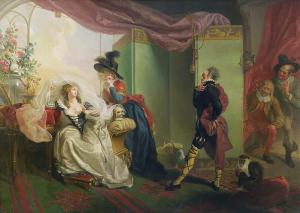Twelfth Night – Act Three Scene Four
Olivia is nervously waiting for Cesario to arrive
OLIVIA
I have sent after him: he says he’ll come;
How shall I feast him? what bestow of him?
For youth is bought more oft than begg’d or borrow’d.
Malvolio enters in yellow stockings and cross gartered. Olivia is horrified
MALVOLIO
Sweet lady, ho, ho.
OLIVIA
Smilest thou?
I sent for thee upon a sad occasion.MALVOLIO
Sad, lady! I could be sad: this does make some
obstruction in the blood, this cross-gartering; but
what of that?
Malvolio is acting strangely to Olivia and smiling and talking “greatness”
OLIVIA
Why, this is very midsummer madness.
Mavolio is left in the “care” of Sir Toby and Maria. They pretend he is possessed by the devil.
SIR TOBY BELCH
…. How do you, Malvolio? how
is’t with you? What, man! defy the devil:
consider, he’s an enemy to mankind.MALVOLIO
Do you know what you say?
MARIA
La you, an you speak ill of the devil, how he takes
it at heart! Pray God, he be not bewitched!
They taunt him and Malvolio, still under the spell of the letter leaves them
MARIA
Get him to say his prayers, good Sir Toby, get him to pray.
MALVOLIO
My prayers, minx!
MARIA
No, I warrant you, he will not hear of godliness.
MALVOLIO
Go, hang yourselves all! you are idle shallow
things: I am not of your element: you shall know
more hereafter.
Alone they congratulate themselves on the joke they have played
FABIAN
If this were played upon a stage now, I could
condemn it as an improbable fiction.
They decide to continue and escalate the “joke”
MARIA
Nay, pursue him now, lest the device take air and taint.
FABIAN
Why, we shall make him mad indeed.
MARIA
The house will be the quieter.
SIR TOBY BELCH
Come, we’ll have him in a dark room and bound. My
niece is already in the belief that he’s mad: we
may carry it thus, for our pleasure and his penance,
till our very pastime, tired out of breath, prompt
us to have mercy on him
Enter Sir Andrew
FABIAN
More matter for a May morning.
He has written the challenge to Cesario. Sir Toby and Fabian stir up Sir Andrew and Viola to fight each other. Praising the opponent and enjoying watching them squirm.
They draw and fight
Enter Antonio
ANTONIO
Put up your sword. If this young gentleman
Have done offence, I take the fault on me:
If you offend him, I for him defy you.SIR TOBY BELCH
You, sir! why, what are you?
ANTONIO
One, sir, that for his love dares yet do more
Than you have heard him brag to you he will.
Antonio is arrested and he pleads to Viola for the money he gave her
ANTONIO
This comes with seeking you:
But there’s no remedy; I shall answer it.
What will you do, now my necessity
Makes me to ask you for my purse? It grieves me
Much more for what I cannot do for you
Than what befalls myself. You stand amazed;
But be of comfort.
He has mistaken Viola for her twin brother Sebastian and she denies having any money of Antonio’s
Antonio is led off believing that Sebastian has been betrayed him, Viola now knows that her brother may be alive.
